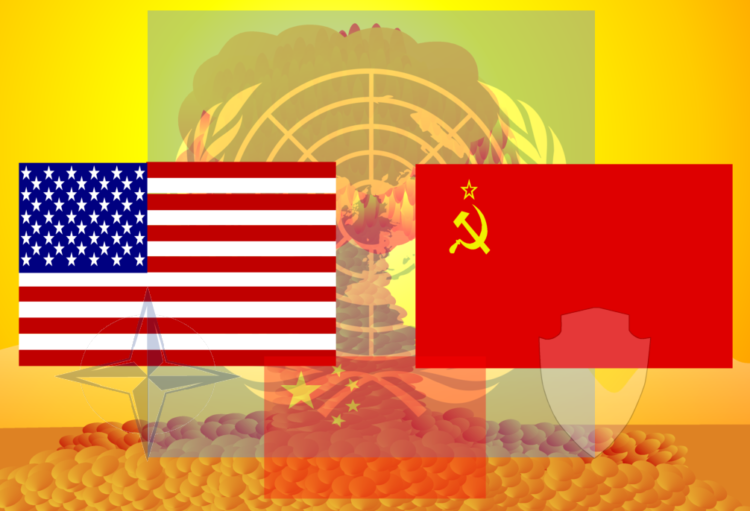“I am getting confused about all these wars we are studying,” one of my college students confessed to me years ago. After we discussed the various nations who fought in World Wars I and II, she asked: “Now, who fought in the Cold War?”
I told her the Cold War was not an actual war. Unlike the two world wars, there were no physical battles between the major adversaries. It was, instead, an extended competition between the United States and the Soviet Union, along with their respective allies. In 1991, the Soviet Union split up into 15 countries, the largest of which is Russia.
But back then, both of these two so-called superpowers wanted to be the most powerful nation in the world, building themselves up while simultaneously trying to reduce the power and influence of the other. Washington and Moscow competed in numerous ways: over money and natural resources like oil, over allies, over weapons technology, over influence and prestige, over space exploration, over ideas.
The Cold War relationship between the two rival nations was often tense. Once, it led to the threat of nuclear war breaking out because Russia wanted to place nuclear missiles in Cuba, very close to the U.S. That brought the world to the brink of what would have been a catastrophic conflict.
But through skill, prudence or luck – or all three – American and Soviet leaders managed to avoid direct combat with each other from 1945 to 1989, the basic period of the Cold War.
A war without fighting?
My student could be forgiven for her confusion. The very term “Cold War” is contradictory and confusing. It was first used in 1947. By using the word “war,” it captured the seemingly life-or-death struggle between the United States and the Soviet Union and between capitalism and communism. But by describing this war as “cold,” it indicates the struggle did not involve weapons and did not result in rival armies seeking to destroy each other.
How could a war be cold? Essentially, by being fought not in the traditional manner of clashing armies, but by all other means short of actual combat.
The Cold War stayed cold for a variety of reasons. Most importantly, the advent of nuclear weapons meant that any conflict between the superpowers risked a nuclear exchange that could have claimed tens of millions of lives and left a swath of destruction in both the Soviet and American homelands.
To avoid such a cataclysmic outcome, policymakers in Moscow and Washington were highly sensitive to the risks of any conflict. They worked hard to find peaceful resolutions to the multiple confrontations and crises they faced between the end of World War II in 1945 and the fall of the Berlin Wall in 1989.
Each superpower also believed that it was engaged in a long-term struggle. Each was convinced that the superiority of its social, political and economic systems would ultimately bring victory in the competition, through peaceful means.
Think about it: Why resort to war, with all the death, devastation and uncertainty it would bring, if you sincerely believe that time – and history – is on your side?
Already have an account? Sign In
Two ways to continue to read this article.
Subscribe
$1.99
every 4 weeks
- Unlimited access to all articles
- Support independent journalism
- Ad-free reading experience
Subscribe Now
Recurring Monthly. Cancel Anytime.
Not a time of peace
Yet the Cold War era was hardly peaceful.
U.S. and Soviet troops never fought each other directly during those years. But numerous Cold War-related conflicts raged across the globe from the 1940s to the 1980s.
The vast bulk of those conflicts occurred in the developing countries of Asia, Africa and the Middle East – the so-called Third World or Global South. In fact, as many as 20 million people died in wars fought between 1945 and 1989. Only 1% of those lost their lives in Europe, the original area of Cold War confrontation. The other 99% died on battlefields of developing nations.
Those conflicts took many forms, including rebellions against colonial powers, civil wars, invasions and revolutions. They also had many different causes. Yet nearly all were affected by the wider Soviet-American struggle for power and influence. And nearly all were intensified and made bloodier and more costly by it.
The era’s most deadly conflicts were the Korean War, from 1950 to 1953, and the Vietnam War, from 1961 to 1975, each of which claimed millions of lives. The United States deployed troops to both of those conflicts, largely because it was determined to contain the expansion of communism.
For its part, the Soviet Union did not participate directly in either war. But it provided aid and support to its communist allies in North Korea and North Vietnam. The Soviet Union’s major ally during the first half of the Cold War, the communist-led People’s Republic of China, contributed massive numbers of troops to the conflict in Korea and provided hundreds of thousands of support troops to the conflict in Vietnam.
In sum, “Cold War” remains a somewhat contradictory term for, and description of, the period from 1945 to 1989. It correctly reflects the crucial fact that the struggle for global supremacy between the United States and the Soviet Union never involved direct combat between the two nation’s military forces. But it minimizes the extensive and bloody litany of conflicts that raged throughout those years, nearly all of which were caused by or affected by their rivalry.
***
This piece is written by Robert J. McMahon, Professor of History, The Ohio State University, for The Conversation. Want to feature your story? Reach out to us at [email protected].










COMMENTS